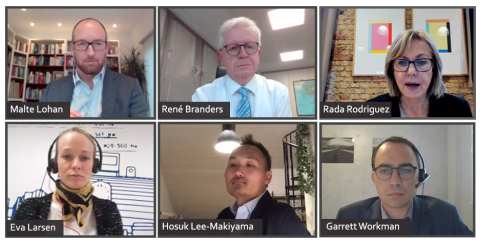Insights into Europe’s future trade strategy
16 November 2020

Flexible global supply chains increase resilience. Moreover, a better access to international markets is essential to deliver Europe’s climate and digital agenda. These were two of the key takeaways that emerged from Orgalim’s latest 'Industrial Strategy in Focus' roundtable on Europe’s future trade strategy, held virtually on 12 November and attracting more than 200 participants.
Taking place on the day the European Commission’s annual report on trade came out and with its public consultation on trade policy closing shortly, the event brought together senior representatives from the Commission, industry and international trade policy experts to discuss such key topics as the trade strategy itself, the evolution of global supply chains and the concept of open strategic autonomy.
Global trade vital for recovery
Orgalim Director General Malte Lohan, moderating the discussion, set the scene and highlighted that, for Europe’s technology industries to help address societal challenges and create new prosperity for Europe’s citizens, "we need to enable our industries’ global leadership in a much more complicated, much more unpredictable global environment.”
Europe’s technology industries are strongly export-oriented and account for around a third of all Europe’s manufactured exports, he pointed out. Currently hit hard by the coronavirus crisis, global trade is vital as they seek to recover from the crisis.
Orgalim President Rada Rodriguez, in her opening remarks, also stressed the importance of remaining open to international trade. She identified three key industry priorities for Europe’s trade policy going forward: "we need to prioritise long term competitiveness, focus on technology leadership, and continue enhancing market access for our companies,” she said.
What is open strategic autonomy?
As a starting point for moving forward, Ms Rodriguez reiterated Orgalim’s call for clarity on the notion of resilience and specifically the concept of ‘open strategic autonomy’ that has been put forward by the Commission.
Offering insights from the Commission side, Kevin Keary, DG Trade and Member of Cabinet to former Commissioner Hogan, European Commission, said that, "simply put, open strategic autonomy means striking the right balance between a Europe that is open and remains open for business and a Europe that defends its companies and consumers from unfair competition and hostile actions." He signalled a more assertive approach to trade policy, including efforts to reform the rules-based multilateral order and strengthen the toolbox for enforcement.
How was it able to be so resilient? "We saw that a flexible global supply chain has been a core strength in how we managed to go through the pandemic in a successful way," she said.
Bringing the perspective of SMEs, René Branders, CEO of FIB Belgium and President of the Belgian technology industries’ association, Agoria, additionally stressed the need for better enforcement of standards and called for improved support on IP and management of data.
Orgalim has welcomed the European Commission’s Trade Policy Review and its answer to the public consultation and positions on other trade policy topics can be found here. You can access the full recording of the roundtable here.
Our Industrial Strategy in Focus series continues on 2 December with an expert roundtable on industrial AI and its impact on existing legislation. Registration for that event is now open and we warmly invite you to join us for another lively discussion.

LATEST NEWS
How can we create a dynamic, competitive European high-tech manufacturing base?
Orgalim's key recommendations offer policymake...
